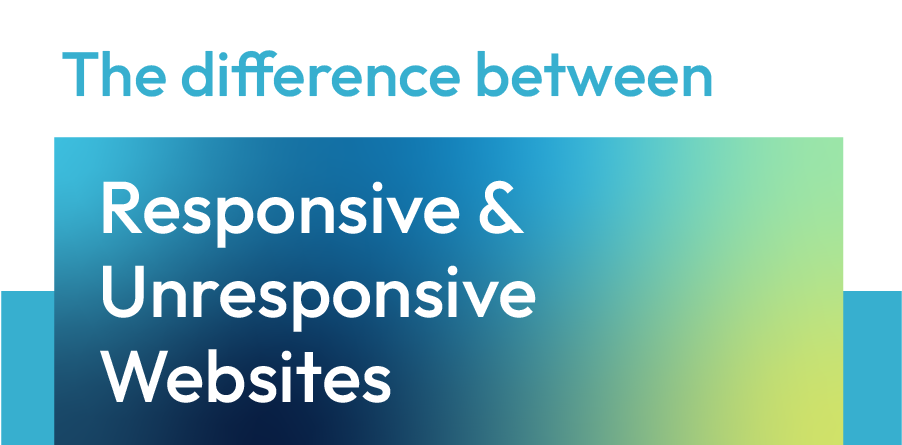What's the Difference Between Responsive and Unresponsive Websites?

Responsive web design has become a buzzword in the digital marketing realm. However, unlike many trendy topics, the “responsive” craze is well-founded.
In fact, making sure your website is user-friendly and visually pleasing on any device – desktop, mobile phone, or tablet – is crucial. In this blog, we’ll discuss responsive design, unresponsive design, and why the former is fundamental to digital success.
What is Responsive Design?
Responsive design, or RWD, allows developers to code a website once – and the site will properly reflow for different devices. Because of this, responsive websites look good on desktops, mobile devices, and tablets.
How does responsive design work?
Non-developers, stick with me for one semi-technical paragraph.
Responsive design works through Cascading Style Sheets (CSS). CSS dictates style properties on a website, such as color, resolution, screen size, etc. Responsive sites are built to respond to the size of your browser and display differently, depending on your device.
What is Unresponsive Design?
As you may have guessed, unresponsive design is the opposite of responsive design.
Rather than automatically adapting at a code-level for different screen sizes, unresponsive sites just get smaller to fit a smaller screen. Unfortunately, this often leads to pinching and zooming to read content or interact with the site.
At this point, most users will leave.
How does unresponsive design "work"?
Unresponsive design also uses CSS to dictate stylistic elements. However, unresponsive sites have set boundaries. Unresponsive CSS dictates the size of the borders, images, text, and other design elements, regardless of the screen size.
Why is Responsive Design Important?
Responsive design enhances mobile-friendliness
Over half of all searches are conducted on mobile devices. This means that if your website is not visually appealing and user-friendly on mobile devices, you’re easily missing out on 50% of all Google searches.
Additionally, users expect sites to load quickly on their phones. Over 50% of mobile users abandon sites that take longer than 3 seconds to load.
Responsive design provides better user experiences
38% of people will stop engaging with a website if the layout is unattractive, and 88% of consumers won’t return to a site after one bad experience. A little harsh? Website visitors are unwavering in their judgement, because they expect to find what they need right away.
Responsive design increases conversions
People convert when they trust a company, and 75% of consumers judge a company’s credibility based on website design. If your website only looks credible on a desktop, you could miss out on prospective customers looking at your site on their mobile device.
Beyond trust, consider usability! If a customer wants to purchase something on your website but can't access their cart or complete the checkout process, they may leave and find a similar product elsewhere.
Responsive design is SEO-friendly
Google values user experience, and responsivity is one step towards a positive customer experience for your website visitors. In essence, a responsive site is a prerequisite to search engine visibility.
Is Your Website Responsive?
Yes!
Great. Responsive design is a first step toward visibility on the web, and search engine optimization (SEO) should follow.
No.
You may be able to find your site on your mobile phone or tablet, but that doesn't mean your site is responsive. Responsive sites display differently to accommodate various screen sizes, reflowing to fit nicely onto your tablet or mobile phone. Unresponsive sites display on other screen sizes, but they do not adjust at the code-level for those screen sizes.
Can you switch to a responsive design?
Unfortunately, switching from an unresponsive website to a responsive website is not as simple as pushing an “on” button or reworking a little CSS. Websites are built to be responsive from the ground-up. If your site is not, you will likely need replatforming or redesign.
Our website team defines replatforming and redesign like this:
- Replatforming is the process of transferring a website from one content management system (CMS) to another, without altering design elements on the website. At RivalMind, we often transfer websites from WordPress to Duda.
- Redesign involves reimagining a website, a process that often involves rebranding, navigational changes, and, sometimes, a CMS transfer as well.
RivalMind: Cutting Edge Website Design
At RivalMind, we develop calculated, measurable websites designed to deliver new customers. We specialize in
Duda,
WordPress, and
Shopify development, and we have a portfolio of examples to demonstrate our expertise. To receive a quote or learn more about our services, contact our team at (331) 228-9636 or via our contact form.

Meet the Author
Jessica Goodrum
Director of Creative Services
Jessica Goodrum is a digital marketer with over a decade of experience in digital project management. As Director of Creative Services at RivalMind, she is responsible for the success of website design and development projects, as well as social media client growth. Her approach to management – both projects and staff – is “transparency.” She consistently outlines project objectives and the steps to get there, assessing how RivalMind can improve upon every client’s experience.
Specialties: Duda Web Development, Keeping It All On Task
Looking for more organic website traffic?
Welcome to RivalMind. Our purpose is to help your business thrive. We are a digital marketing agency that offers SEO, PPC, Web Design, Social Media and Video Solutions as tools to our clients for online business development and growth.
Contact us today to get started!
Blog Contact Form
Connect with Us:




